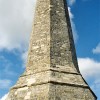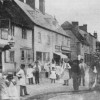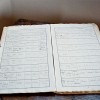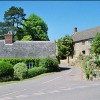In the churchyard at Iwerne Minster, under a memorial stone, lie the remains of John Willis, gentleman of East Orchard. He died on the 23rd of April 1760, in his sixty-third year. Described as a man of “unblemished integrity” he was the master of Orchard school for thirty years and one of the eminent writing masters of his day, attracting to this quite part of Dorset scholars from Europe and the dominions.
His skills with the pen and his ability to pass on these skills earned him a considerable fortune. His copies were said to be equal, if not superior to copper plates. His Will reveals he had estates, land and tenements in several parishes including East Orchard, Iwerne Minster and Compton Abbas, which earned him a substantial annual rental income. On his death it was his brother Robert and his nephew John who inherited the income from all his accumulated wealth.
According to Hutchins he was “a native of Child Okeford” and Hutchins went on to describe him as one of the most eminent writing masters in Dorset and possibly the kingdom. Apparently, by study and application Willis trained himself to a level of perfection in this art that was recognised internationally.
A contemporary of Willis, William Massey, had this to say about him; “he was a fine penman, but never published anything from the rolling-press except a few single copies, for the use of his own school, engraved by Mr George Bickham and Mr Thorogood… As this gentleman never had the small pox, it is reported that he had a strong notion or opinion, that if he came to London, he should have it; on which account he could not be prevailed upon to see that famous city, though he had a strong inclination to it.”
In the quite churchyard at Iwerne Minster, on his memorial stone are included the words:
“Envy be dumb, great Willis scorns thy spite.
Thou must allow that he alone could write.
Most distant regions celebrate his fame,
The world concurs to eternize his name.
In all things equal to the best of men,
But had himself no equal with the pen.”



